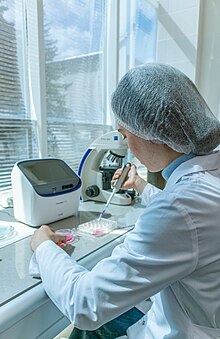
Back Biotegnologie Afrikaans Biotechnologie ALS Biotecnolochía AN تقانة حيوية Arabic জৈৱ প্ৰযুক্তি Assamese Bioteunoloxía AST Biotexnologiya Azerbaijani بیوتکنولوژی AZB Биотехнология Bashkir Biotechnologie BAR

Biotechnology is a multidisciplinary field that involves the integration of natural sciences and engineering sciences in order to achieve the application of organisms and parts thereof for products and services.[1]
The term biotechnology was first used by Károly Ereky in 1919[2] to refer to the production of products from raw materials with the aid of living organisms. The core principle of biotechnology involves harnessing biological systems and organisms, such as bacteria, yeast, and plants, to perform specific tasks or produce valuable substances.
Biotechnology had a significant impact on many areas of society, from medicine to agriculture to environmental science. One of the key techniques used in biotechnology is genetic engineering, which allows scientists to modify the genetic makeup of organisms to achieve desired outcomes. This can involve inserting genes from one organism into another, and consequently, create new traits or modifying existing ones.[3]
Other important techniques used in biotechnology include tissue culture, which allows researchers to grow cells and tissues in the lab for research and medical purposes, and fermentation, which is used to produce a wide range of products such as beer, wine, and cheese.
The applications of biotechnology are diverse and have led to the development of essential products like life-saving drugs, biofuels, genetically modified crops, and innovative materials.[4] It has also been used to address environmental challenges, such as developing biodegradable plastics and using microorganisms to clean up contaminated sites.
Biotechnology is a rapidly evolving field with significant potential to address pressing global challenges and improve the quality of life for people around the world; however, despite its numerous benefits, it also poses ethical and societal challenges, such as questions around genetic modification and intellectual property rights. As a result, there is ongoing debate and regulation surrounding the use and application of biotechnology in various industries and fields.[5]
- ^ "Biotechnology". IUPAC Goldbook. 2014. doi:10.1351/goldbook.B00666. Archived from the original on January 20, 2022. Retrieved February 14, 2022.
- ^ Ereky, Karl. (June 8, 1919). Biotechnologie der Fleisch-, Fett-, und Milcherzeugung im landwirtschaftlichen Grossbetriebe: für naturwissenschaftlich gebildete Landwirte verfasst. P. Parey. Archived from the original on March 5, 2016. Retrieved March 16, 2022 – via Hathi Trust.
- ^ "Genetic Engineering". National Human Genome Research Institute, US National Institutes of Health. December 15, 2023. Retrieved December 18, 2023.
- ^ Gupta, Varsha; Sengupta, Manjistha; Prakash, Jaya; Tripathy, Baishnab Charan (October 23, 2016). "An Introduction to Biotechnology". Basic and Applied Aspects of Biotechnology: 1–21. doi:10.1007/978-981-10-0875-7_1. ISBN 978-981-10-0873-3. PMC 7119977.
- ^ O'Mathúna, Dónal P. (April 1, 2007). "Bioethics and biotechnology". Cytotechnology. 53 (1–3): 113–119. doi:10.1007/s10616-007-9053-8. ISSN 0920-9069. PMC 2267612. PMID 19003197.
© MMXXIII Rich X Search. We shall prevail. All rights reserved. Rich X Search